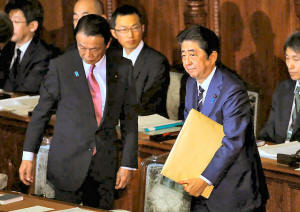|
Japan PM aims to strengthen U.S. alliance
under President Trump
 Send a link to a friend
Send a link to a friend
 [January 20, 2017]
By Kiyoshi Takenaka [January 20, 2017]
By Kiyoshi Takenaka
TOKYO (Reuters) - Japanese Prime Minister
Shinzo Abe, speaking in parliament hours before U.S. President-elect
Donald Trump takes office, said on Friday he wanted to further
strengthen the Japan-U.S. alliance.
Trump sparked worries in Tokyo and the rest of the Asia-Pacific with
campaign comments which included a pledge to make allies pay more for
the security provided by U.S. forces and opposition to the Trans-Pacific
Partnership (TPP) trade deal.
"The Japan-U.S. alliance has been, is and will be the cornerstone of our
country's diplomatic and security policies. This is an immutable
principle," Abe said in his policy speech at the start of the regular
parliament session.
"I am aiming to visit the United States as soon as possible to further
fortify the bond of alliance together with new President Trump."
Abe met with Trump in New York after the election in November and called
him a "trustworthy leader".
In his speech to parliament, the prime minister repeated his support for
TPP, which will go into deep freeze if the United States drops out.
"As a flag bearer for free trade, we will build an economic system of
the 21st century based on fair rules. The TPP agreement sets the
standard for that purpose and serves as the foundation for future
economic cooperation," he said.

Japan has ratified the TPP and on Friday notified New Zealand,
secretariat for the TPP, it had completed the domestic procedures for
the pact, becoming the first country among the 12 signatory nations to
do so. New Zealand has ratified the TPP, but not completed the whole
domestic procedures.
Koichi Hamada, an adviser to Abe and emeritus professor of economics at
Yale University, told Reuters that Japan should push back if Trump bases
trade and other economic policy on "wrong economics", in an unusually
direct expression of concern about potential protectionism.
GLOBAL UNCERTAINTY
Echoing the sentiment in Abe's speech, Foreign Minister Fumio Kishida
called strengthening the Japan-U.S. alliance key to regional peace and
prosperity, and said Japan is ready to play a role as a stabilizing
power in a world ripe for change.
[to top of second column] |

Japan's Prime Minister Shinzo Abe (R) and Deputy Prime Minister and
Finance Minister Taro Aso attend the ordinary session of parliament
in Tokyo, Japan, January 20, 2017. REUTERS/Toru Hanai

"Uncertainty is growing in the international community, while Japan
has conducted stable politics and diplomacy over the past four years
and increased its international presence," Kishida said in his
foreign policy speech.
"As a stable power, Japan needs to work with countries it shares
fundamental values with and take a leading role in the international
community, so that this ... will be the year of advancement of
Japan's national interest and of global peace and prosperity."
Abe's ruling coalition enjoys a two-thirds majority in parliament's
powerful lower house, while the transition of power in the United
States, key elections this year in France and Germany and Britain's
departure from the European Union are making the global economic and
political outlook uncertain.
Trump's inauguration ceremony will take place later on Friday in
Washington, which braces for more than a quarter-million protesters
expected during the New York real estate tycoon's swearing-in.
Following the speeches by Abe and Kishida, Finance Minister Taro Aso
pledged to stick to the government's target of achieving a balanced
budget in the fiscal year ending in March 2021, by pursuing both
economic growth and fiscal consolidation.
(Reporting by Kiyoshi Takenaha; Editing by Michael Perry)
[© 2017 Thomson Reuters. All rights
reserved.]
Copyright 2017 Reuters. All rights reserved. This material may not be published,
broadcast, rewritten or redistributed.
 |